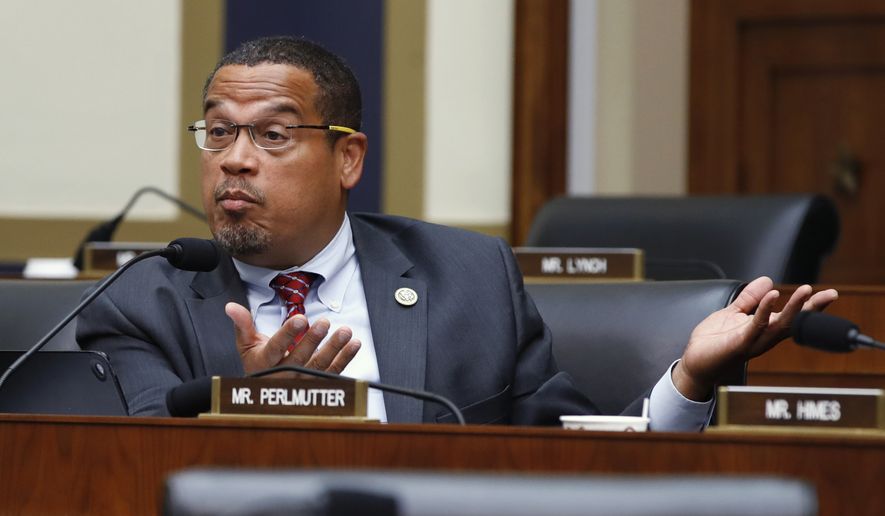ST. PAUL, Minn. — Rep. Keith Ellison asked himself the question that lingers over his political career before any of the 1,000-plus supporters at his recent rally could: Why was he leaving the safe congressional district he’s represented for more than a decade to run for state attorney general?
“Attorneys general all over this country led the fight against this Muslim ban,” he said to raucous applause. “It is attorneys general that are fighting and suing to protect an open internet.”
A year after falling short in his bid to chair the Democratic National Committee and with his party stuck in the minority, Ellison is angling for a change.
Democrats nationwide have increasingly looked to attorneys general in their states as a counter to President Donald Trump’s administration and its policies. State attorneys general pushed back against the administration’s ban on travel from several mostly Muslim countries, winning early court battles before a more limited version was upheld by the Supreme Court. More recently, they sued the Trump administration to stop the separation of children and parents who were in the country without permission.
Ellison, who, in 2006, became the first Muslim elected to Congress, said his quest isn’t personal. He has a lengthy priority list, including protecting President Barack Obama’s health care law and restoring so-called “net neutrality” provisions scrapped by the Federal Communications Commission under Trump.
“For me, it is a dramatic oversimplification to say that this is about Trump. It’s not,” he said. “But it is about policies that he’s pursuing that I think hurt consumers, hurt people’s rights.”
A 54-year-old with the campaign vigor of someone 30 years younger, Ellison has carved out a reputation as an energizing force in state and national politics while making frequent appearances on cable news shows. He was an early supporter of Bernie Sanders’ presidential bid and co-chaired the House Progressive Caucus until last year, recently taking charge of the push to expand Medicare for all.
Even before Ellison entered the race, there were signs of the new thirst among Minnesota Democrats for a more activist attorney general. Lori Swanson, the three-term Democratic incumbent, was humbled at a June endorsing convention by a little-known challenger who criticized her as too careful.
When she abruptly decided to run for governor, Ellison joined a stampede of five Democrats who filed to run for a seat that Republicans haven’t won in more than half a century. Though Ellison hasn’t won a statewide race, he has a higher public profile than any of his Democratic challengers and will likely benefit from an expected heavy turnout at the Democratic primary, where a fierce competition for the nomination to run for his congressional seat will be settled.
Though Ellison has significant rivals – his opponents include state Rep. Debra Hilstrom and Matt Pelikan, the party-backed candidate – his heavyweight status was underscored by Sanders’ endorsement, which came with appearances at a pair of July rallies.
“Bernie understands how important state attorneys general are to the economic livelihood and prosperity for working people,” Ellison said. “He knows attorneys general are on the forefront.”
If Ellison wins in August and again in November, he wouldn’t be the first congressman to make such a shift since Trump’s election. That distinction belongs to California’s attorney general, Xavier Becerra, who accepted an appointment to the job in December 2016.
Becerra has been among the most visible Democratic attorneys general in the country, filing and joining dozens of lawsuits challenging the Trump administration. He said the role of an attorney general hasn’t changed – only its visibility.
“Now we have an adversary that’s a lot more formidable than most that we would encounter, because it’s the federal government,” said Becerra, who considers Ellison a close friend from their six terms in Congress together. “He’s going to be taking on issues as attorney general that he worked on as a member of Congress … That’s what’s helped me.”
But Ellison is sure to face scrutiny in his first statewide bid, including renewed questions about his connections to Minister Louis Farrakhan, the head of Nation of Islam who has a history of making anti-Semitic comments. Ellison has sought to distance himself from Farrakhan since his involvement in the 1995 “Million Man March” and disavowed the Nation of Islam in his first congressional bid in 2006.
Republicans have warned that Ellison would focus too much on countering Trump at the expense of the office’s other responsibilities – and even fellow Democrats haven’t made Trump such a visible foil in their own campaigns. Minnesota’s attorney general represents hundreds of state agencies and boards, helps safeguard senior citizens against scams and fields thousands of consumer complaints each week.
“He has specifically stated that he wants to use the office of attorney general to obstruct the President’s agenda. He wants to go into court and use the politicized judiciary to achieve legislative-type ends that Democrats can’t achieve through the actual Legislative process,” said Doug Wardlow, the leading Republican candidate.
Ellison said his attorney general ambitions weren’t based around a platform to fight back against Trump, nor was it triggered solely by frustration with Congress.
“Maybe the legislative branch will one day reclaim its role as the first among equal branches of government,” he said. “I just think that if I really want to serve people, I need to be in another part of the government apparatus.”




Please read our comment policy before commenting.